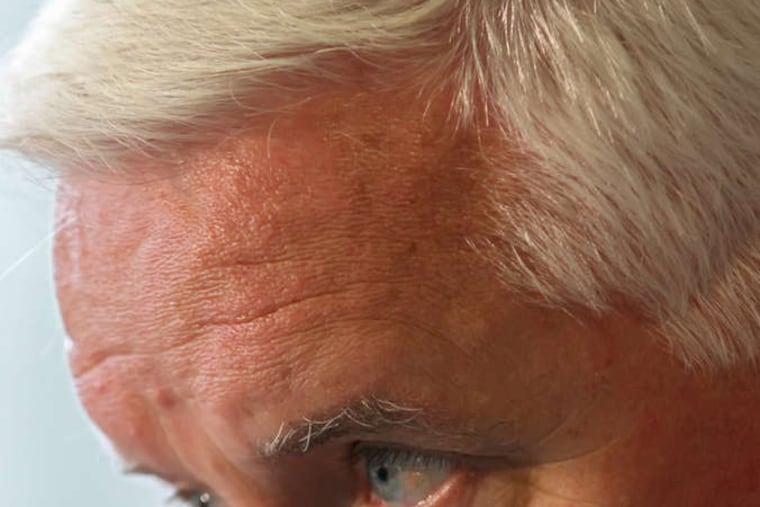Corbett's approval rating at historic low in new poll
Gov. Corbett's approval rating tumbled to its lowest point yet in a closely watched independent poll Thursday, leaving the Republican in a historic hole as he gears up for his 2014 reelection campaign.

Gov. Corbett's approval rating tumbled to its lowest point yet in a closely watched independent poll Thursday, leaving the Republican in a historic hole as he gears up for his 2014 reelection campaign.
Only one in five registered voters believes Corbett has done a good enough job to earn a second term, the Franklin and Marshall College Poll found.
Sixteen percent rated his performance in office "excellent" or "good," compared with 76 percent who said he was doing an "only fair" or "poor" job.
"That is the lowest job-performance number for any governor in modern history," said G. Terry Madonna, director of the survey. "Nobody has been where he is."
The poll jolt arrived after a summer in which Corbett failed to get his agenda through a legislature controlled by his own party, had to reshuffle his staff again, and had problems with a pair of cabinet appointments.
In addition, the governor faces public dissatisfaction over education cutbacks and property-tax hikes across the state, and a mild flap over his failure to list a vacation condo in Hilton Head, S.C., on a financial-disclosure form.
It is as if the governor has a reverse Midas touch; rather than gold, everything he touches turns to dross.
"The polls have had consistent bad news for Gov. Corbett," said Kevin Washo, former executive director of the state Democratic Party and a consultant. "It's just a drip, drip, drip. People are rejecting this administration."
Mike Barley, Corbett's campaign manager, said it's hard to put a lot of stock in early polls, with an as-yet-undifferentiated group of Democratic challengers.
"It is difficult to get a sense of the race until you have an opponent, folks are talking about the issues and you have the chance to make a good case about what the governor found when he took office and the path he has put the state on," Barley said Thursday.
Corbett inherited a $4.2 billion deficit and was able to close it without raising taxes. Still, former Gov. Ed Rendell, a Democrat, had a 28 percent job approval rating in October 2010 as he prepared to leave office (and as he was calling for an income tax increase).
When Rendell was entering his 2006 reelection campaign, his approval rating was just below 50 percent in the F & M Poll. Republican Gov. Tom Ridge was at about 60 percent heading into his 1998 reelection.
Of course, both Rendell and Ridge had the good fortune to run for second terms when the economy was doing well. Recovery from the great recession has been slow in Pennsylvania, and voters are likely directing some of their angst over the economy and job security at Corbett. Sixty-two percent of survey respondents said that the state was headed in the wrong direction.
If there is any comfort for the governor, other public officials also fared worse in this latest Pennsylvania survey than they had in previous ones conducted by Franklin & Marshall.
President Obama's job approval rating among Pennsylvanians dropped from 44 percent in May to 34 percent, and his favorability rating, a measurement of personal popularity, fell from 52 percent to 41.
U.S. Sen. Pat Toomey (R., Pa.) had a 26 percent favorability rating, down from 35 percent in May. Sen. Bob Casey (D., Pa.) dropped from 53 percent favorability to 34 percent.
One problem for Corbett may be that his recent agenda - liquor privatization, lottery privatization, pension reform, highway and mass transit funding - does not match up with the issues that are foremost on voters' minds, Madonna said.
Voters listed education, jobs and the economy as their top priorities when asked to name the issues they were most concerned about. Privatization of the lottery and the state liquor system did not even make the list.
"One message seems to be that Tom Corbett is out of sync with the voters' concerns - the priorities don't line up," Madonna said.
Interest in education as a top issue has spiked, and there is strong disapproval of the administration's handling of it, the veteran pollster and political scientist said.
Early in his term, Corbett made steep cuts in state subsidies to basic education. Though the administration says it has actually put more state money into education budgets since then than any previous governor, "People don't see it," Madonna said. "They see cuts in classes and programs, increasing property taxes, all over the state."
The Corbett administration, he said, "is not winning the narrative war."